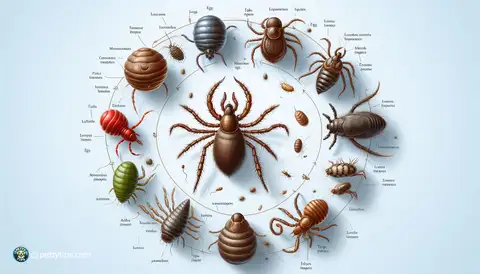
Understanding the Lifecycle of Fleas and Ticks: A Guide for Pet Owners
Zoe Kremer - Sep 19, 2024 - 6 min read


Dealing with a cancer diagnosis in your pet can be overwhelming. It's essential to reach out to your veterinarian for guidance. Your vet will provide insights into the type of cancer, its stage, and potential treatment options. Remember, every pet is unique, and the treatment plan should be tailored to their specific needs. Understanding the diagnosis is the first step in providing the best care for your furry friend.
Don't hesitate to ask your veterinarian questions about your pet's condition. Understanding the prognosis, potential side effects of treatment, and expected outcomes can help you make informed decisions. Your vet is there to support you and your pet through this challenging time. Take advantage of their expertise and ask as many questions as you need to feel comfortable with the treatment plan.
Pets with cancer may experience discomfort or pain, depending on their condition and treatment. It's crucial to create a comfortable environment for your pet at home. Consider providing soft bedding, gentle heating pads for sore joints, and plenty of love and attention. Your pet will appreciate the extra care during this difficult time.
Stress can exacerbate your pet's symptoms and weaken their immune system. Try to minimize stressors in your pet's environment by maintaining a consistent routine and providing a calm, peaceful atmosphere at home. Avoid loud noises, crowded spaces, and situations that may cause anxiety for your pet. A stress-free environment can improve your pet's overall well-being and quality of life.
proper nutrition is crucial for pets with cancer to maintain strength and support their immune system. Consult with a veterinary nutritionist to develop a diet plan tailored to your pet's needs. They can recommend specific foods, supplements, and feeding schedules to optimize your pet's nutritional intake during treatment.
Pets undergoing cancer treatment may experience changes in appetite and weight loss. Monitor your pet's weight closely and consult with your veterinarian if you notice any significant changes. Adjusting their diet or introducing appetite stimulants may help ensure they're getting the nutrients they need to stay strong and healthy.
Cancer treatment can sometimes cause pain and discomfort for pets. Work with your veterinarian to develop a pain management plan that includes medications, alternative therapies, and lifestyle adjustments. Regularly assess your pet's comfort level and make adjustments to their treatment plan as needed to ensure they're as comfortable as possible.
In addition to physical pain, pets with cancer may also experience emotional distress. Be there for your pet emotionally, offering comfort and reassurance during this challenging time. Spend quality time together, engage in activities they enjoy, and shower them with love and affection. Your presence and support can make a world of difference in your pet's overall well-being.
Regular veterinary check-ups are essential for monitoring your pet's progress and adjusting their treatment plan as needed. Your vet will perform physical exams, blood tests, and imaging studies to assess your pet's response to treatment and detect any changes in their condition. Stay proactive about scheduling appointments and follow your vet's recommendations for ongoing care.
As a pet owner, it's essential to be vigilant about monitoring your pet for any changes in their behavior or symptoms. Keep an eye out for signs of pain, discomfort, or illness, and report them to your veterinarian promptly. Early detection of complications or disease progression can lead to more effective treatment options and better outcomes for your pet.
When caring for a pet with cancer, it's essential to prioritize their quality of life above all else. Consider your pet's comfort, happiness, and overall well-being when making decisions about their care. Discuss your pet's quality of life with your veterinarian regularly and be prepared to make difficult decisions if their condition worsens.
palliative care focuses on providing comfort and relief from symptoms rather than curing the underlying disease. Explore palliative care options with your veterinarian to ensure your pet's comfort and dignity are maintained throughout their illness. Palliative treatments may include pain management, supportive care, and alternative therapies to improve your pet's quality of life.
Caring for a pet with cancer can take an emotional toll on pet owners. It's essential to seek support from friends, family, or support groups who understand what you're going through. Share your feelings and experiences with others who can offer empathy, encouragement, and practical advice to help you cope during this challenging time.
Remember to prioritize self-care as you care for your pet with cancer. Make time for activities that bring you joy and relaxation, whether it's spending time outdoors, practicing mindfulness, or engaging in hobbies you enjoy. Taking care of yourself will enable you to be a better caregiver for your pet and navigate the challenges of their illness with resilience and strength.
As your pet's condition progresses, you may need to make difficult decisions about their end-of-life care. When assessing your pet's quality of life, consider factors such as pain, discomfort, mobility, and overall well-being. Consult with your veterinarian to discuss your pet's prognosis and options for end-of-life care, including hospice care and euthanasia.
Ultimately, you know your pet best, and you'll be able to recognize when their quality of life is no longer acceptable. Trust your instincts and make decisions that prioritize your pet's comfort and dignity. Lean on your veterinarian for guidance and support during this emotional time, and know that you're making the best choice for your beloved companion.
In conclusion, caring for a pet with cancer requires patience, compassion, and a proactive approach to their well-being. By understanding your pet's diagnosis, creating a comfortable environment, and prioritizing their nutrition, pain management, and emotional support, you can help them navigate their illness with dignity and grace. Remember to prioritize your own well-being and seek support when needed, and trust that you're doing everything you can to provide the best possible care for your furry friend.